229 Search Results for partner strategies
December 16, 2019
by Carole Zangari -
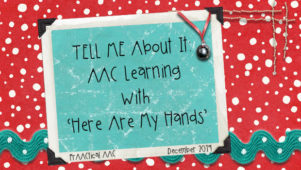
Welcome to a new edition of TELL ME About It, with AAC Specialists Maggie Judson and Jeanna Antrip. Maggie and Jeanna are speech-language pathologists who work in the Assistive Technology Department for the Belleville Area Special Services Cooperative (BASSC) in southern Illinois. They are AT/AAC facilitators and provide evaluations, direct therapy, consultations, and trainings. They’ve collaborated on a series to share their experiences in supporting preschool classrooms that implement the TELL ME program that Lori Wise and I created. If you missed the earlier posts in this series, you can get caught up using the links below. From Head to Toe I Went Walking Brown Bear, Brown Bear TELL ME AAC Literacy Kits TELL ME About It: AAC Learning with ‘Here Are My Hands’! TELL ME About Reading: The fourth book in the TELL ME program (Teaching Early Language and Literacy through Multimodal Expression) is “Here Are My Hands.” A... [Read More...]
November 21, 2019
by Carole Zangari -
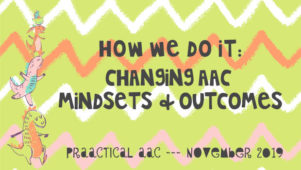
As AAC interventionists, we spend a lot of time helping therapists, teachers, families, and others develop their appreciation for multimodal communication and build their skills in using supportive strategies. In today’s post, Deidre Dobbels, a speech-language pathologist specializing in AAC, language and literacy development in young children, shares her thoughts on how we can do this effectively. Deidre is employed by Barrington CUSD #220 in the Northwest Suburbs of Chicago in which a Universal Core Approach to Language and Literacy has been in place for nearly a decade. Deidre authored a multi-media early developing core vocabulary curriculum used by her school district as well as by therapists and teachers throughout the Midwest. In her guest post, Deidre talks about her experiences in addressing the AAC needs of young children with complex communication needs. Changing Mindsets, Changing Outcomes As a young Speech Language Pathologist working in Early Childhood classrooms, I was... [Read More...]
October 21, 2019
by Carole Zangari -
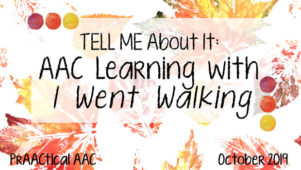
Jeanna Antrim and Maggie Judson are back with another installment of their series on implementing TELL ME in preschool classrooms. Each month, they share their tips and suggestions for helping classroom teams target core vocabulary with a different book. Maggie and Jeanna are speech-language pathologists who work in the Assistive Technology Department for the Belleville Area Special Services Cooperative (BASSC) in central Illinois. They are AT/AAC facilitators and provide evaluations, direct therapy, consultations, and trainings. In today’s post, Jeanna and Maggie share their ideas and experiences in target a set of core words with activities that focus on the book, I Went Walking. Looking for the other posts in this series? TELL ME About It: AAC Literacy Kits Brown Bear, Brown Bear, What Do You See? ::::::::::::::::::::::::::::::::::::::::::::::::::::::::::::::::::::::::::::::::::::::::::::::::::::::: TELL ME About It: AAC Learning with I Went Walking TELL ME About Reading: The second book in the TELL ME program (Teaching Early... [Read More...]
September 23, 2019
by Carole Zangari -
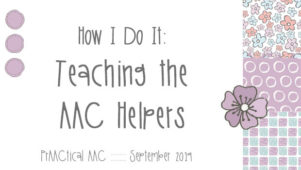
We welcome Amanda Samperi back to these pages with more ideas for prAACtical ways to address AAC implementation challenges. As an SLP, Amanda has served individuals with complex communication needs in school, home, and medical settings. She has presented on AAC-related topics st ASHA, an IEE Electrical Safety Workshop, and at the AAC in the Cloud Conference. Amanda hopes to continue sharing her knowledge and experiences about AAC through her blog, AAC is where it’s AT. Today, she shares some ideas for helping staff members better support AAC learners. :::::::::::::::::::::::::::::::::::::::::::::::::::::::::::::::::::::::::::::::::::::::::::::::::::::::::::::::::::::::::::: How I Do It: Teaching the Helpers Mr. Rogers had it right – you will always find people helping. Helpers make our world go round. We rely on them in times of tragedy, celebrate with them in times of joy, and lean on them in times of need. Helpers play a large role in both the home and school lives... [Read More...]
September 9, 2019
by Carole Zangari -
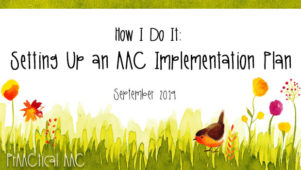
Today we have a visit from California-based SLP Kristen Powell who is stopping by to share some of the ways she builds collaboration and sets up AAC implementation plans. Kristen works both in the public school system and runs her own private practice, Creative Communication. She specializes in assessment, device trials, and implementation training of AT and AAC. Kristen is passionate about providing individuals with the most appropriate AT and supports to improve their communication with their family and peers. :::::::::::::::::::::::::::::::::::::::::::::::::::::::::::::::::::::::::::::::::::::::::::::::::::::::::: In 2016, I got a job as a speech-language pathologist at a local school district. One of my students had multiple service providers both school and medical based. In addition, my student used both high and low tech Augmentative and Alternative Communication (AAC). I was faced with the challenge of helping the entire team know how to use the AAC system with the student, know what successful communication looks... [Read More...]
September 5, 2019
by Carole Zangari -
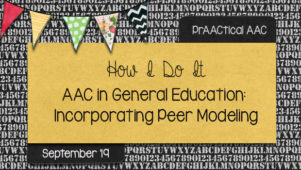
Looking for examples of how AAC is successfully incorporated into inclusive education? Today, we head to upstate New York to learn from AAC SLP Sarah Gregory who shares her experiences in supporting students in general education settings. In this post, Sarah shares her ideas for using peer modeling to support AAC learning. Enjoy! :::::::::::::::::::::::::::::::::::::::::::::::::::::::::::::::::::::::::::::::::::::::::: AAC in General Education: Incorporating Peer Modeling Authentic inclusion of students with Complex Communication Needs (CCN) or non-speaking students is essential and can also be difficult to achieve. One of the most effective strategies I have found is involving all students in AAC learning. Folks in my district started a peer modeling program a few years ago and we found this to be a powerful tool in achieving our goals for academic inclusion and social belonging. In this blog post, I will outline the why and the how of our current peer modeling program.... [Read More...]
July 25, 2019
by Carole Zangari -
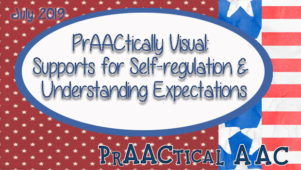
Looking to up your game in creating and using visual supports in your AAC work? Sit tight because the post below has plenty of information and downloadable files to help you out. Today, AAC SLP Tabi Jones-Wohleber is back to continue her series, this time focusing on supports for self-regulation and comprehending expectations for different situations. Tabi has worked in schools and early intervention supporting families, professionals, and individuals with AAC needs in West Virginia and Maryland. Tabi’s prAACtical approach to supporting AAC professionals has enriched the work of many of our readers. If you missed the initial segments in the series, you can get those here. Part 1 Part 2 Visual and Environmental Supports for Self-regulation & Understanding Expectations I hold the position that all behavior is communication. Attending to what an individual is attempting to communicate through behavior provides insight into why the behavior is occurring. And to... [Read More...]
July 1, 2019
by Carole Zangari -
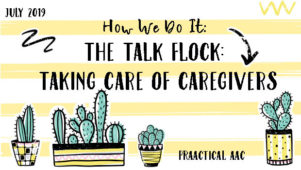
How can we better support parents and caregivers of children with AAC needs? Meredith Laverdure and Jaime Lawson, who are SLPs and former co-workers, wanted to do more for the families they served. Meredith is currently a doctoral student at Old Dominion University. Her clinical and research interests include building communicative competence for children with complex communication needs with group interventions, as well as family- and community-level support. Jaime has predominately worked with pediatric clients, focusing on AAC/AT evaluations and intervention. Her clinical and research interests include enhancing communicative opportunities for children across settings and in various social settings, group intervention, family-centered therapy, and communication partner training. In this post, Meredith and Jaime share their experiences in developing The Talk Flock, a parent education and support group. Enjoy! The Talk Flock: Taking Care of Caregivers As speech-language pathologists in the outpatient pediatric setting with a busy AAC/AT clinic, we tried to... [Read More...]
May 2, 2019
by Carole Zangari -
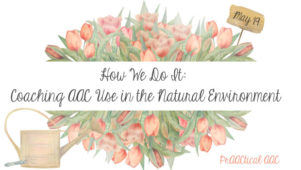
If it’s May, it must be Better Hearing and Speech Month (#BSHM), and we’re thrilled to kick off the festivities by two Illinois-based SLPs, Dr. Jill Senner and Matt Baud. They have a wealth of AAC experience and have generously shared their expertise here in several previous posts. Today, we welcome them back as they share some advice on helping staff use AAC in natural settings. Enjoy! ::::::::::::::::::::::::::::::::::::::::::::::::::::::::::::::::::::::::::::::::::::::::::::::::::: Put Me in, Coach: Coaching AAC Use in the Natural Environment “Help, I already trained the team and the device is still not being used outside of my sessions.” Sound familiar? We hear this a lot. This actually is quite common if one key training element is missing. In fact, without this critical instructional component, there’s only about a 5% chance that the strategies you’re teaching will actually be used in the natural environment. What is the essential ingredient to maximizing your... [Read More...]
April 18, 2019
by Carole Zangari -
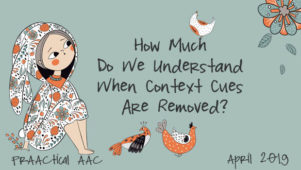
Have you ever worked with clients who could benefit from AAC but resisted using it because they don’t realize that other people can’t understand their speech? Or a family who resists AAC because they perceive their loved one as intelligible when they are actually depending on the context to help them decipher the message? Have you ever worked with service providers who disagree on just how comprehensible their client’s natural speech really is? It doesn’t happen often, but there are occasions when it can be helpful to remove context cues from the mix and take a hard look at how well we understand someone’s natural speech. Formal testing may certainly play a role here, but informal assessment activities can also be helpful. Here is a task we sometimes use in these situations. The Materials Develop a list of 20 words and/or 20 sentences that will serve as the stimuli. For... [Read More...]









